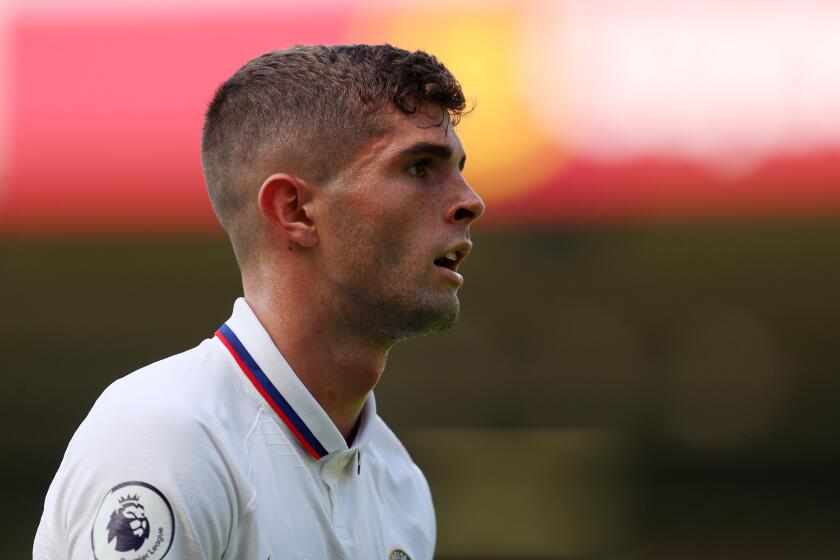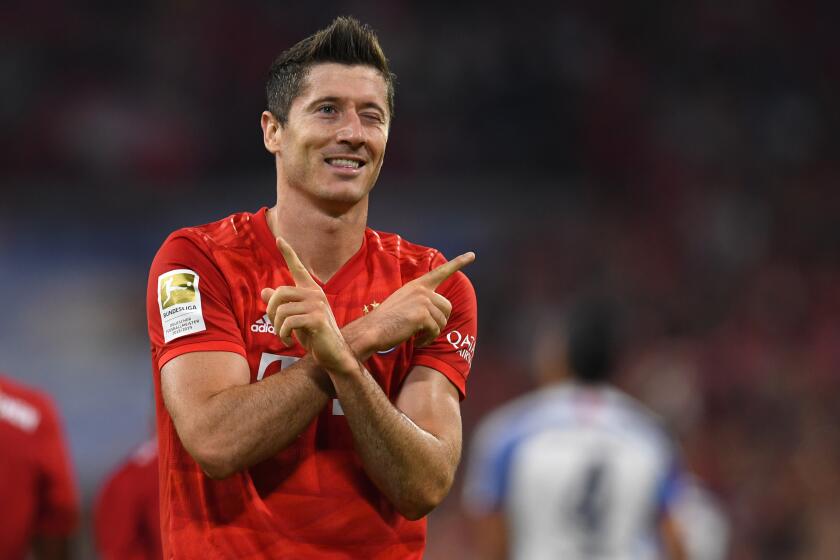How Holocaust survivors, immigrants and a soap opera star formed a soccer powerhouse
- Share via
The most dominant team in Southern California’s long soccer history is one you’ve probably never heard of. But it is one that should never be forgotten.
Maccabee Los Angeles materialized virtually overnight in 1971, more than two years before the professional North American Soccer League came to the city, then disappeared just as suddenly 11 years later.
In between, it played in seven U.S. Open Cup finals, winning five of them; no team in the 106-year history of the nation’s oldest soccer competition can match that.
Yet it wasn’t so much how often the semipro club won as what it stood for that makes it memorable. Although Maccabee — sometimes spelled Maccabi — was founded by Israeli expatriates and Holocaust survivors, it was among the most diverse clubs in the 12-member Greater Los Angeles Soccer League, where teams with names like the San Pedro Yugoslavs, the L.A. Armenians, San Pedro Croat and Atletico Latino built their rosters along ethnic lines.
“The Croatian team was Croatian. The Hungarian team was mostly Hungarian. But we had a very, very different mixture,” said Eli Marmur, at 75 still as sharp and fit as when he played as a defender on four of Maccabee’s national championship teams. “We were the Maccabees but we had two Argentines, three people from Mexico, six Israelis and a German.
Chelsea’s Christian Pulisic tops the U.S. national team roster that is missing some players needed by their MLS teams fighting for playoff spots.
“It is so appropriate to what is happening today because we were so inclusive.”
The German was actor Eric Braeden, who was born Hans-Jorg Gudegast in the middle of World War II, the son of a Nazi party member. Braeden, who would go on to portray the loathsome Victor Newman in the TV soap opera “The Young and the Restless,” said he didn’t learn of his father’s past until long after his death. Playing alongside Marmur on Maccabee’s back line — and scoring the first goal in the team’s first U.S. Open Cup final — was his contribution to repairing German-Jewish relations, he said.
Maccabee’s significance was more than symbolic though. The team, whose uniform featured a large Star of David in the center of its jersey, became a symbol of both Jewish pride and defiance — despite the fact that half the players wore a crucifix beneath the star and blessed themselves before taking the field.
“Playing for Maccabee was something for us,” said Marmur, who played seven seasons in the Israeli Premier League. “Not that we had to prove a point, but we were looked at differently. It’s not just doctors and lawyers. It’s also Jews with muscles.”
Sometimes they had to flex those muscles. After a game with a Hungarian team ended in a brawl, the Maccabee players were taken away in police cars for their protection. Other teams that couldn’t slow Maccabee with their play tried to do so with anti-Semitic slurs.
“They didn’t think that we would beat them. So they resorted to this language,” said Marmur, the team’s enforcer, who played with his fists almost as much as he did his feet. “They wanted us to do something that will take us out of the game.
“We made a statement.”
The Open Cup, formerly known as the National Challenge Cup, is modeled on England’s FA Cup in that it is open to teams from every level of the national soccer pyramid. MLS teams have won the last 20 tournaments, however, with Atlanta United beating league rival Minnesota United in this week’s final.
The NASL, the professional league that predated MLS as the country’s top-tier league, didn’t allow its teams to play in the Open Cup in the 1970s and ’80s, leaving the competition to be dominated by amateur and semipro clubs such as the Brooklyn Italians, New York Greek American and Philadelphia United German-Hungarians — gritty ethnic teams from urban centers.
The core of the Maccabee team was made up of former Israeli professionals who, like Marmur, came to Southern California to study and in protest of a Premier League rule that he said forced players to sit out two seasons before they could change teams.
Many never went back.
Jonah Fontela of U.S. Soccer, which oversees the Open Cup, said the late ’70s and ‘80s “were the Wild West” in American club soccer, with leagues folding and reforming overnight, players jumping from team to team and clubs frequently erasing, then redrawing, the line separating pros from amateurs.
It many ways it was also a golden era, especially in Los Angeles — although with the NASL refusing to even play exhibitions against semipro teams, clubs like Maccabee never got a chance to find out just how good they really were.
Maccabee, named after a group of Jewish rebel warriors who took control of Judea and founded the Hasmonean dynasty during classical antiquity (167 BC), was clearly too good for the teams it did play, going 35-0 in 1976-77 when it won its third U.S. Open Cup. That was the season Leo Kulinczenko, a young defender who had played for the Ukrainian Lions in Chicago, joined the team.
“That was a great experience,” Kulinczenko said. “We thought of ourselves as U.S. champions. It was great to be a part of that.”
In soccer on TV, slow-starting league champions in France and Germany will try to get on track, while in England a pair of European finalists face off this weekend.
The Greater Los Angeles Soccer League, which dated to 1903, staged weekend double and tripleheaders at Daniels Field in San Pedro and Jackie Robinson Stadium on the West Side, whose bumpy pitches matched the unevenness of the rough-and-tumble games.
“There were not a lot of fans,” Kulinczenko remembered.
There was talent, though. The Maccabee roster included Moshe Hoftman, a former Israeli international who came to the U.S. to study engineering at UCLA; Benny Binshtock, who reportedly turned down a spot on Israel’s 1970 World Cup team because he couldn’t get the time off from work; UCLA standout Jerry Schmitman; Marmur, who was in graduate school at USC; and Braeden, a three-event national track and field champion in Germany . who began his acting career in the U.S. by portraying Nazi soldiers on TV.
When he played for Maccabee, Braeden told Fontela, opponents would insult him as both a Nazi and a Jew.
“Make up your mind,” he would answer. “Which is it?”
Ole Mikkelsen, a UCLA All-American, was recruited to Maccabee by a group of teammates who played for both teams. It was a huge step up from college.
“Going into the Greater L.A. league, you’re 18 years old and all of a sudden thrown in with men that played at a professional level and all still competitive,” said Mikkelsen, a forward who went on to play for two teams in the NASL.
“The Greater L.A. Soccer League and the Maccabee experience provided so much value in bridging the gap from college sports to make a living.”
Very few found that bridge led to a long career in professional soccer, though. Mikkelsen played just two seasons in the NASL, Kulinczenko played one year in the American Soccer League and the former Israeli professionals never played a game after Marmur helped Maccabee transform from a semipro soccer team into a youth sports club in 1983.
Many found success in other arenas, though. Marmur opened physical therapy centers in Beverly Hills and Encino and was inducted into halls of fame in Southern California and Israel. His son Ori, who attended Maccabee games as a boy, is the director of original films for Netflix.
Mikkelsen, who coached the Ventura Fusion soccer club, is chief exeuctive of a life-sciences start-up, Schmitman has chiropractic offices in Sherman Oaks and Calabasas and Braeden, a two-time Emmy winner, is in his 39th year on “The Young and the Restless.”
If they had come along a decade or two later, they might have enjoyed long, if not lucrative, careers in MLS. But, Mikkelsen says, they would have missed out on a more important experience.
“Many of us consider ourselves pioneers,” he said. “We certainly take pride in where the sport is today, but most of my peers would also say, ‘I wouldn’t change a thing.’
“The times we had were fantastic. We were fortunate. It felt like grabbing on to Superman’s cape and just holding on for the ride.”
More to Read
Go beyond the scoreboard
Get the latest on L.A.'s teams in the daily Sports Report newsletter.
You may occasionally receive promotional content from the Los Angeles Times.










